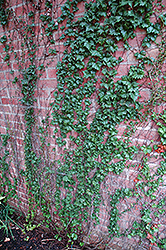Low's Boston Ivy
Parthenocissus tricuspidata 'Lowii'
Height: 20 feet
Spread: 24 inches
Sunlight:
![]()
![]()
Hardiness Zone: 4
Other Names: Japanese Creeper
Description:
A dream come true for garden designers, this variety is pretty well identical to Boston Ivy, except that it has quite tiny foliage, grows smaller and is slower growing, excellent fall color too; a wonderfully artistic vine in talented hands
Ornamental Features
Low's Boston Ivy has dark green deciduous foliage on a plant with a spreading habit of growth. The tiny lobed leaves turn an outstanding red in the fall.
Landscape Attributes
Low's Boston Ivy is a multi-stemmed deciduous woody vine with a twining and trailing habit of growth. It lends an extremely fine and delicate texture to the landscape composition which can make it a great accent feature on this basis alone.
This woody vine will require occasional maintenance and upkeep, and can be pruned at anytime. It is a good choice for attracting birds to your yard, but is not particularly attractive to deer who tend to leave it alone in favor of tastier treats. It has no significant negative characteristics.
Low's Boston Ivy is recommended for the following landscape applications;
- Hedges/Screening
- General Garden Use
Planting & Growing
Low's Boston Ivy will grow to be about 20 feet tall at maturity, with a spread of 24 inches. As a climbing vine, it tends to be leggy near the base and should be underplanted with low-growing facer plants. It should be planted near a fence, trellis or other landscape structure where it can be trained to grow upwards on it, or allowed to trail off a retaining wall or slope. It grows at a slow rate, and under ideal conditions can be expected to live for approximately 20 years.
This woody vine does best in full sun to partial shade. It is very adaptable to both dry and moist locations, and should do just fine under average home landscape conditions. It is considered to be drought-tolerant, and thus makes an ideal choice for xeriscaping or the moisture-conserving landscape. It is not particular as to soil type or pH, and is able to handle environmental salt. It is highly tolerant of urban pollution and will even thrive in inner city environments. This is a selected variety of a species not originally from North America.
